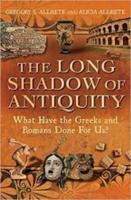
Bloomsbury (2019) p/b 411pp £16.99 (ISBN 9781350083387)
The authors state that this is a scholarly book intended for the general reader, to provide an entertaining journey through myriad topics, highlighting the influence of ancient Greece and Rome upon the modern world, specifically that of the European-based Western civilization. Divided into nine chapters, the final being new to this second edition (it was first published in 2012), the book covers a wide range of topics, from the practical in food and shelter through to the intellectual of philosophy and literature. It is written in an accessible manner, supporting the assertion that no prior knowledge of the classical world is necessary for its enjoyment. For those readers with prior knowledge, a huge range of anecdotes from the ancient world illustrates the authors’ points, with interesting and engaging examples provided to relate the classical world to the modern, albeit sometimes randomly associated. The authors’ detailed knowledge of ancient texts and history is evident on every page, and this book would serve as a good reminder of what sources exist for various topics, even for an undergraduate student.
Each chapter offers a specific focus, such as ‘food and shelter’, or ‘the family, and journeys of life’, and elucidates ancient customs and practices whilst highlighting the frequent similarities between those and the modern world. Such examples given are athletes following special high-carbohydrate diets to give them the desired size and strength, and the familiar artefacts that have been found relating to the raising of children, such as cradles, feeding bottles, and toys and games. Differences are also highlighted: for example, the authors point out the male-dominated aspects of ancient societies, and together with the similarities, the general reader is given a well-rounded sense of why the ancient world still has resonance for the modern.
Readers may be troubled by the odd minor issue—for example, English currency is referred to as ‘lbs’ in order to fit a specific example, and English pence referred to as ‘d’, which has not been the case since decimalisation in 1971. Similarly, Spartan boyhood is likened to the English boarding school, and whilst this reviewer could not attest to the appropriateness of this analogy, the authors’ ability to do so might also be questioned. Nevertheless, the sheer range of ancient examples provided is breath-taking, providing a primer for the study of the classical world; major texts and figures from both Greece and Rome are distributed thoroughly throughout, in context, although at times the number of references can be overwhelming. Perhaps, at times, fewer, and a little more detail of those offered, would allow for greater reflection on the links being made.
The addition of the final chapter is a welcome update and successfully addresses the previous point. It takes three main aspects of modern life—climate change, celebrity, and globalisation—and gives more detail to each. Celebrity is perhaps the least developed, although the recurring figure of Cleopatra gives some coherence, but highlights interesting trivia such as the similarities in depilatory habits between ancients and moderns. Globalisation reflects recent scholarship around the Romanisation/Globalisation debate and highlights the truly multi-cultural nature of the ancient world, particularly the Roman Empire.
The case study on climate change, however, is particularly successful. Bringing to the fore a range of facts, opinions and recent (2017) scholarship contributing to debates surrounding the ‘Third Century Crisis’, this section allows greater engagement with examples and therefore allows for a greater immersion in initial ideas about the topic. Arising from reflections on conversations with their students, the authors also provide an informative and accessible insight into how the ancient world can be made relevant for a student requiring persuasion. There is also an excellent bibliography, organised by chapter, which demonstrates the wealth of research and serves also as a quick reference guide for initial research on the specified topics.
This is an engaging, well-written and well-informed text, written accessibly, which gives a succinct overview of the ancient world. It serves as a perfect introduction for anyone needing to be persuaded why we should still study the classical world.
Anactoria Clarke
The Open University
